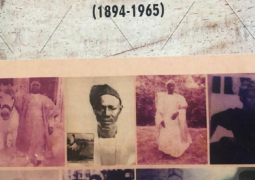
From a Commonwealth short story prizewinner comes a masterful epic that examines Uganda’s history through generations of a cursed family.
This Ugandan debut novel begins in 2004 with the death of a man who is killed by a mob after being mistaken for a thief. As three market sellers speculate about his bad fortune, one mentions “the curse”. We are then taken back to the 18th century and the eponymous Kintu. His name echoes the creation myth in which Kintu is the first person on Earth, but in Makumbi’s hands he is just a man: a powerful governor burdened with more wives than he would like, on a journey to pay homage to the new king. Tragedy strikes and Kintu’s son dies by Kintu’s own hand, an act that haunts his family down the generations.
The winner of the 2014 Commonwealth short story prize, Makumbi has here written a multi-generational epic that is equal parts imagination and research. The details of the 18th-century royal Buganda court are finely drawn, and full of detail and intrigue.
In Kintu’s time, the curse manifests itself as a mental breakdown experienced as a consequence of his son’s death; the concept of inherited chemical imbalances may have been unknown to the 18th century, but is familiar when it comes up again in relation to Miisi, one of Kintu’s descendants, living in the early 21st century.
The beauty of the book is that it gives a snapshot of different periods of Uganda’s history through characters who are dynamic and engaging, with interesting personal stories of their own. Kintu has been hailed as the “great Ugandan novel”, and deservedly so. While Makumbi documents the Ugandan story, she also subverts Ugandans’ understanding of who they are as a people, questioning the popular conceptions of gender, religion and mental illness. And she looks at patriarchy not through the consequences it may have for women, but from the male perspective. (All but one of the six sections are told from a man’s point of view.) The result is a book that – like Makumbi’s subversion of the Kintu myth – examines the burdens of patriarchy on African men without blaming women.
There are some surprising historical omissions. Makumbi mostly avoids describing both the colonial period, which so often seems the obligation of the historical African novel, and Idi Amin’s reign, which seems the obligation of the Ugandan novel.
Kintu is better for not retreading this worn ground. Published in Kenya four years ago, it had trouble finding a British publisher, and the lack of that familiar historical territory may have been a factor; but as word of mouth spread, it became hard to ignore.
So yes, Kintu is an important book. It is also a very good one. Makumbi’s sentences are densely packed and lyrical. Here, from early on, is a succinct summary of a childhood: “His father’s head-wife’s tyranny had led to the formation of cliques among the children in order to protect themselves. Kintu, an only child whose mother had died, had neither clique nor mother to protect him.”
The characters are varied, from the governor Kintu to richly drawn minor characters, such as the cheeky 21st-century mortuary attendant. Sly humour is peppered among the stories of unwanted wives and overprotective fathers and religion run amok. As Makumbi wryly observes of one couple: “Their house had no ceiling because in the 50s, when Kanani had built it, Jesus was coming.”
This is a complex profile of a family and a country – both of its nation building and the urban and pastoral variations within its borders. Makumbi took 10 years to write it, and one can see the time and care in the deceptively casual manner in which she drops information here and there, laying traps for characters 50 years before they are sprung. With a novel that is inventive in scope, masterful in execution, she does for Ugandan literature what Chinua Achebe did for Nigerian writing.
Avialable at Timbooktoo tel 4494345





